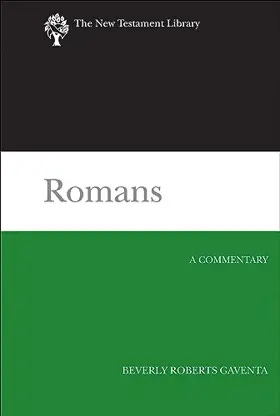Engaging Scripture Book Club
If you want to follow along, over the next several weeks, I will be reviewing Dr. Beverly Gaventa’s new Romans commentary (New Testament Library, Westminster John Knox).
If you want to learn about the book and the club details, click HERE.
Reminder: I will give general thoughts and summary of the week’s reading for free; I will also add my own critical thoughts and reflections for paid subscribers. So, feel free to follow along and hopefully you’ll enjoy the book club. There is no formal sign up, just check your email inbox for each week’s review, and if you haven’t subscribed yet to Engaging Scripture, you can do so now.
Introduction
Today is the first review post. I will basically introduce the series and cover the front matter of the book, including the commentary introduction.
Gaventa’s commentary appears within the New Testament Library series from Westminster John Knox. This series actually has its origins in the Old Testament Library series. The first OTL volume published was on the Psalms by Artur Weiser in 1962. The NTL series started in 2002 with Raymond Collins on the Pastorals. Notable NTL volumes published so far include John Carroll on Luke, Marianne Meye Thompson on John, Frank Matera on 2 Corinthians, Martin de Boer on Galatians, Luke Timothy Johnson on Hebrews, Judith Lieu on the Johannines, and Brian Blount on Revelation. As you can tell, the series is predominantly moderate mainline in terms of scholarship and theological perspective. Gaventa’s Romans is sure to be a major highlight of the series going forward.
Gaventa’s volume begins with an extensive bibliography; it will be immediately notable that she pays attention to not only modern scholarship, but also key voices from the patristic period like Ambrosiaster and Chrystom. Her bibliography is almost 40 pages long, which amounts to well over 500 pieces of scholarship—that reflects a lifetime of study! Speaking of scholarship, from my perusal of the commentary and a look at the index, I am impressed with her engagement with a variety of Romans scholars. Here are some scholars she cites the most: Jewett (the most by far), Cranfield, Barth, Käsemann, Dunn, Fitzmyer, Hultgren, Moo, Ross Wagner (her former Princeton collegue), and Wolter. (NTW, by the way, is mentioned seldomly.)
The formal introduction of the commentary is insightful and state-of-the-discussion, but noticeably short, only about 20 pp. She spends time on the expected topics of provenance, date, and situation. One helpful feature: she provides a sweeping overview of the letter in just a few pages. I like when scholars do that, it gives you a quick sense of the forest before getting into the trees.
One of the unique features of Gaventa’s commentary is the prime place she gives to Phoebe and other women connected to this letter and its situation. She begins the introduction with a brief word about how the Romans would have “heard” Paul’s letters from the lips of Phoebe (nb: Gaventa thinks that Phoebe was the letter carrier and reader). Gaventa’s commentary also appears to be dedicated to this important early Christian woman: “With gratitude for Phoebe of Cenchraea and all her sisters.”
One more thing that is clear from the introduction: Gaventa reads Romans from an apocalyptic perspective. While she acknowledges several practical reasons why Paul wrote the letter (e.g., mission to Spain, Jerusalem collection, local skirmishes), she believes too many Romans scholars have been shortsighted. The real substance of Romans, in her opinion, is the way Paul articulated the gospel as an apocalyptic act of redemption: “[The gospel] is nothing less than the reclamation of a cosmos in thrall to Sin and Death” (13).
[HEADS UP: Week of July 29: Romans 1:1-12 (Read pp. 21-40)]




